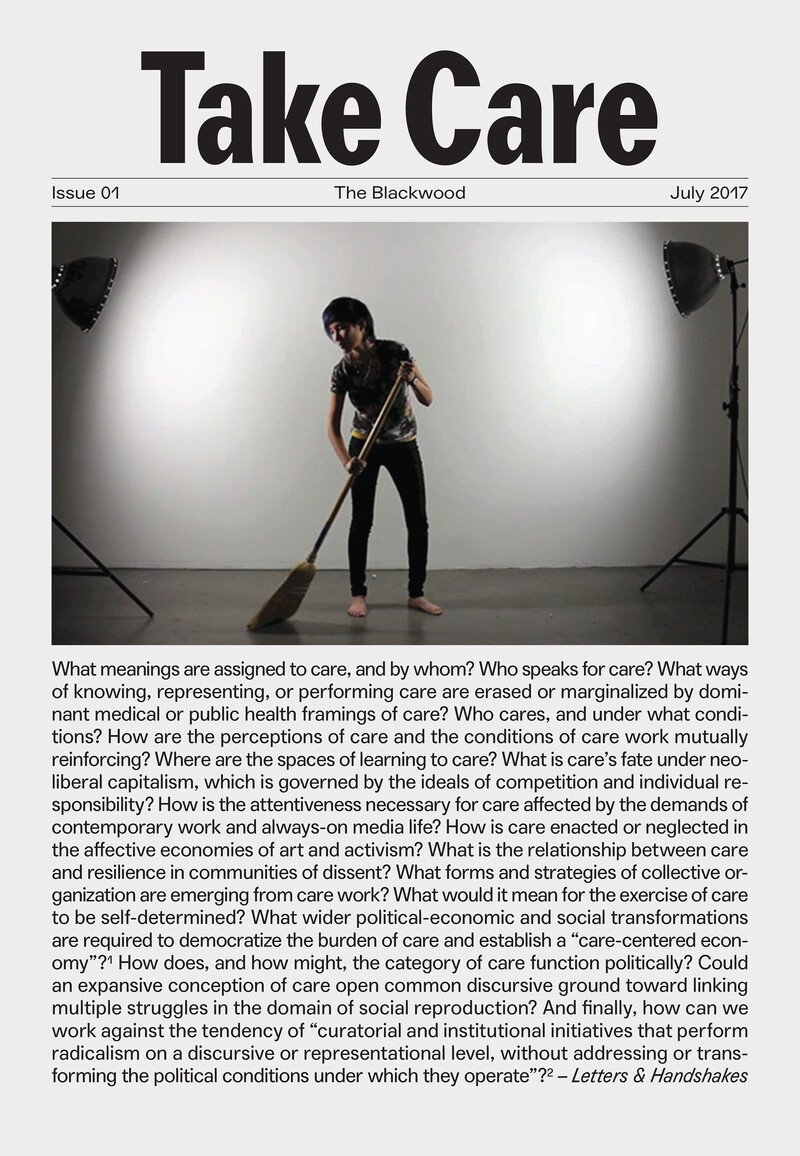- 00.0Cover & EditorialAnchi Lin, Letters & Handshakes
- 00.1Care and Dying: Albert Banerjee in Conversation with Steven EastwoodAlbert Banerjee, Steven Eastwood
- 00.2Care as InfrastructureAi-jen Poo, Letters & Handshakes
- 00.3covering, distribution, cleaning my instrumentRadiodress
- 00.4Dilemmas of CareEmma Dowling
- 00.5CareForceMarisa Morán Jahn
- 00.6Antinomies of Self-CareLauren Fournier, Lynx Sainte-Marie, Sarah Sharma
- 00.7Other forms of convivialityPark McArthur, Constantina Zavitsanos
- 00.8It Takes Work to Get the Natural LookChloé Roubert, Gemma Savio
- 00.9Water is LifeOnaman Collective
- 00.10Seniors' Advocacy in OntarioCare Watch, Kassandra Hangdaan
- 00.11In Sickness and StudyCarolyn Lazard
- 00.12Shut. Muskrat. DownLabrador Land Protectors
Cover & Editorial
- Anchi Lin
- Letters & Handshakes

What meanings are assigned to care, and by whom? Who speaks for care? What ways of knowing, representing, or performing care are erased or marginalized by dominant medical or public health framings of care? Who cares, and under what conditions? How are the perceptions of care and the conditions of care work mutually reinforcing? Where are the spaces of learning to care? What is care’s fate under neoliberal capitalism, which is governed by the ideals of competition and individual responsibility? How is the attentiveness necessary for care affected by the demands of contemporary work and always-on media life? How is care enacted or neglected in the affective economies of art and activism? What is the relationship between care and resilience in communities of dissent? What forms and strategies of collective organization are emerging from care work? What would it mean for the exercise of care to be self-determined? What wider political-economic and social transformations are required to to democratize the burden of care and establish a “care-centered economy”?11Ina Praetorius, The Care-Centered Economy: Rediscovering What Has Been Taken for Granted, Heinrich Böll Foundation, Publication Series Economy + Social Issues 16 (2015): https://www.boell.de/sites/default/files/the_care-centered_economy.pdf. How does, and how might, the category of care function politically? Could an expansive conception of care open common discursive ground toward linking multiple struggles in the domain of social reproduction? And finally, how can we work against the tendency of “curatorial and institutional initiatives that perform radicalism on a discursive or representational level, without addressing or transforming the political conditions under which they operate”?22Helena Reckitt, “Support Acts: Curating, Caring and Social Reproduction,” Journal of Curatorial Studies 5, no. 1 (2016): 25. Here, Reckitt draws on Marion von Osten and Andrea Phillips, among others.
—Letters & Handshakes
See Connections ⤴
Letters & Handshakes is a collaboration of Greig de Peuter (Department of Communication Studies, Wilfrid Laurier University) and Christine Shaw (Blackwood Gallery and Department of Visual Studies, University of Toronto Mississauga).
Letters & Handshakes’ past projects include the exhibitions I stood before the source and Precarious: Carole Condé + Karl Beveridge, the forum Fighting Foreclosed Futures: Politics of Student Debt, and the symposium and micropublication Surplus3: Labour and the Digital.
See Connections ⤴